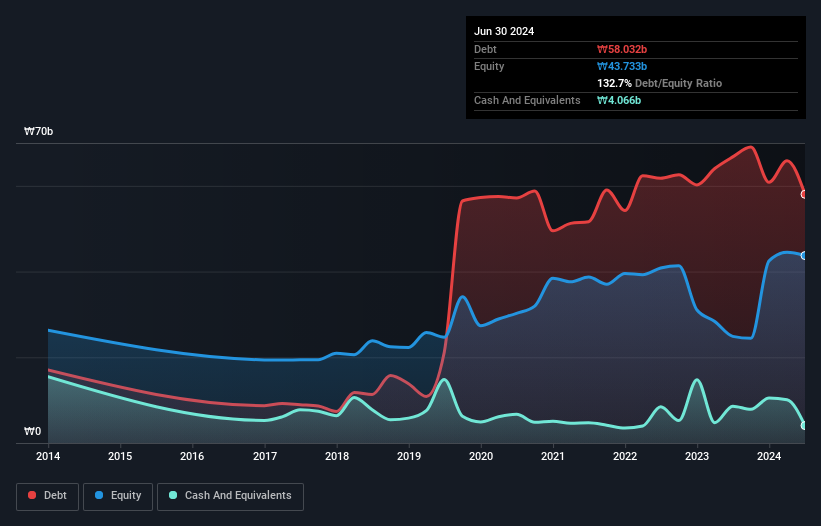- South Korea
- /
- Construction
- /
- KOSDAQ:A069140
Health Check: How Prudently Does Nuriplan (KOSDAQ:069140) Use Debt?

Howard Marks put it nicely when he said that, rather than worrying about share price volatility, 'The possibility of permanent loss is the risk I worry about... and every practical investor I know worries about.' So it might be obvious that you need to consider debt, when you think about how risky any given stock is, because too much debt can sink a company. Importantly, Nuriplan Co., Ltd. (KOSDAQ:069140) does carry debt. But the real question is whether this debt is making the company risky.
What Risk Does Debt Bring?
Debt and other liabilities become risky for a business when it cannot easily fulfill those obligations, either with free cash flow or by raising capital at an attractive price. If things get really bad, the lenders can take control of the business. While that is not too common, we often do see indebted companies permanently diluting shareholders because lenders force them to raise capital at a distressed price. By replacing dilution, though, debt can be an extremely good tool for businesses that need capital to invest in growth at high rates of return. When we think about a company's use of debt, we first look at cash and debt together.
Check out our latest analysis for Nuriplan
What Is Nuriplan's Debt?
The image below, which you can click on for greater detail, shows that Nuriplan had debt of ₩58.0b at the end of June 2024, a reduction from ₩66.8b over a year. However, it also had ₩4.07b in cash, and so its net debt is ₩54.0b.

How Healthy Is Nuriplan's Balance Sheet?
Zooming in on the latest balance sheet data, we can see that Nuriplan had liabilities of ₩79.6b due within 12 months and liabilities of ₩19.6b due beyond that. On the other hand, it had cash of ₩4.07b and ₩18.2b worth of receivables due within a year. So its liabilities outweigh the sum of its cash and (near-term) receivables by ₩77.0b.
This deficit casts a shadow over the ₩15.5b company, like a colossus towering over mere mortals. So we'd watch its balance sheet closely, without a doubt. After all, Nuriplan would likely require a major re-capitalisation if it had to pay its creditors today. There's no doubt that we learn most about debt from the balance sheet. But it is Nuriplan's earnings that will influence how the balance sheet holds up in the future. So when considering debt, it's definitely worth looking at the earnings trend. Click here for an interactive snapshot.
In the last year Nuriplan had a loss before interest and tax, and actually shrunk its revenue by 11%, to ₩116b. That's not what we would hope to see.
Caveat Emptor
While Nuriplan's falling revenue is about as heartwarming as a wet blanket, arguably its earnings before interest and tax (EBIT) loss is even less appealing. Its EBIT loss was a whopping ₩18b. If you consider the significant liabilities mentioned above, we are extremely wary of this investment. Of course, it may be able to improve its situation with a bit of luck and good execution. But we think that is unlikely, given it is low on liquid assets, and burned through ₩6.4b in the last year. So we consider this a high risk stock and we wouldn't be at all surprised if the company asks shareholders for money before long. When analysing debt levels, the balance sheet is the obvious place to start. However, not all investment risk resides within the balance sheet - far from it. For instance, we've identified 4 warning signs for Nuriplan (3 are concerning) you should be aware of.
Of course, if you're the type of investor who prefers buying stocks without the burden of debt, then don't hesitate to discover our exclusive list of net cash growth stocks, today.
If you're looking to trade Nuriplan, open an account with the lowest-cost platform trusted by professionals, Interactive Brokers.
With clients in over 200 countries and territories, and access to 160 markets, IBKR lets you trade stocks, options, futures, forex, bonds and funds from a single integrated account.
Enjoy no hidden fees, no account minimums, and FX conversion rates as low as 0.03%, far better than what most brokers offer.
Sponsored ContentValuation is complex, but we're here to simplify it.
Discover if Nuriplan might be undervalued or overvalued with our detailed analysis, featuring fair value estimates, potential risks, dividends, insider trades, and its financial condition.
Access Free AnalysisHave feedback on this article? Concerned about the content? Get in touch with us directly. Alternatively, email editorial-team (at) simplywallst.com.
This article by Simply Wall St is general in nature. We provide commentary based on historical data and analyst forecasts only using an unbiased methodology and our articles are not intended to be financial advice. It does not constitute a recommendation to buy or sell any stock, and does not take account of your objectives, or your financial situation. We aim to bring you long-term focused analysis driven by fundamental data. Note that our analysis may not factor in the latest price-sensitive company announcements or qualitative material. Simply Wall St has no position in any stocks mentioned.
About KOSDAQ:A069140
Nuriplan
Provides landscape lighting and landscape facility services in South Korea.
Low and slightly overvalued.
Market Insights
Community Narratives



